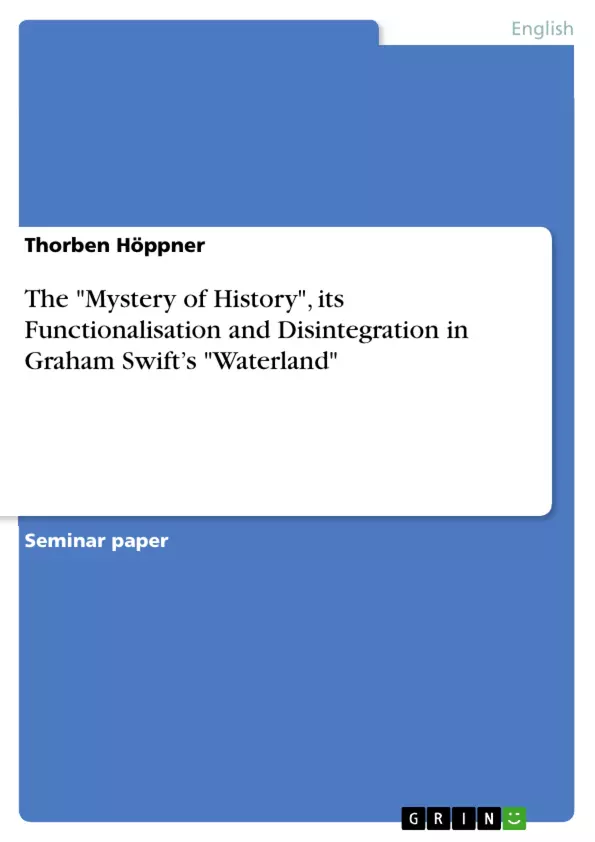This paper investigates how the ambivalent, perhaps even ambiguous definition of ‘historia’ relates to the representation of history in the novel and how this representation again relates to its functionalisation by Tom Crick. To answer this question, this paper will primarily work with Linda Hutcheon’s notion of ‘historiographic metafiction’ while also pointing out similarities to the reading of Waterland as a trauma narrative. In taking a closer look at the protagonist-narrator himself, this paper argues that the protection “from chaos and disorder”, which Landow addresses, is only achieved through a form of historical escapism.
Superficially speaking, Graham Swift’s Waterland is a novel about a history teacher who, having lost his job, forsakes the formal teaching of history, and embarks on an
extracurricular journey into his own past. However, upon closer examination, Waterland is more than that, a novel about history itself. It explores “the whole mystery of ‘history’”, as Swift himself puts it in the introduction to the novel (Waterland, xv). Thus, it is only logical that the novel prefaces its narrative with an insightful epigraph: a dictionary definition of the Latin word ‘historia’, from which the English word ‘history’ originates. As can be seen above, however, said definition is ambivalent- it is “inherently polysemantic” as Judith Ryan notes. James Acheson has likewise pointed out that the fact that “historia can mean either history or fiction is significant, for the historian and the writer of fiction must deal with similar problems in writing about the past”. The natural tendency of language towards proliferation of its meaning aside, the epigraph leaves us with a very ambivalent concept of history, which the narrative of Waterland, in its dealing with history, then builds on. Since such a prominent theme in Waterland, the novel’s representation of history has been thoroughly examined in secondary literature; particularly against the theoretical background of what Linda Hutcheon has identified as ‘historiographic metafiction’.
Inhaltsverzeichnis (Table of Contents)
- Introduction: An Ambivalent Concept of History in Waterland
- Waterland as Historiographic Metafiction
- Tom Crick and the Functionalisation of History
- Tom Crick's Detective Work - Trauma and Meaning-Making
- Trying to "eliminate fear": Escapism in Waterland
- Living an "amphibious life": Tom Crick as an Allegory of History
- Consequences for the Narrative: Unsteady Underpinnings – Personal, Local and Global Disintegration of History
- Conclusion
Zielsetzung und Themenschwerpunkte (Objectives and Key Themes)
This paper examines the representation of history in Graham Swift's novel Waterland, focusing on its ambivalent nature and its functionalisation by the protagonist, Tom Crick. It explores the relationship between the novel's representation of history and the concept of "historiographic metafiction" as outlined by Linda Hutcheon. The paper also considers the novel's themes of trauma and escapism.
- Ambivalent concept of history in Waterland
- Historiographic metafiction and its application to Waterland
- The functionalisation of history by Tom Crick
- Trauma and meaning-making in the novel
- Escapism as a coping mechanism for historical trauma
Zusammenfassung der Kapitel (Chapter Summaries)
The introduction explores the ambivalent definition of "historia" as presented in the novel's epigraph and how it sets the stage for the novel's exploration of history. Chapter 2 delves into the concept of "historiographic metafiction" and its relevance to Waterland, highlighting the novel's focus on the subjective construction of history. Chapter 3 examines Tom Crick's personal journey into the past, focusing on his detective work, his attempts to escape fear, and his ambivalent relationship with history.
Schlüsselwörter (Keywords)
Key terms and concepts explored in this paper include: historiographic metafiction, trauma fiction, historical representation, meaning-making, escapism, Waterland, Graham Swift, Tom Crick, "historia."
- Arbeit zitieren
- Thorben Höppner (Autor:in), 2021, The "Mystery of History", its Functionalisation and Disintegration in Graham Swift’s "Waterland", München, GRIN Verlag, https://www.grin.com/document/1354999



